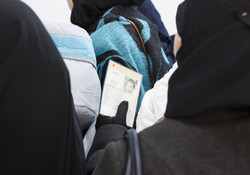WHO supports Turkey to ensure full immunization of refugee children

WHO/Ali Saltan
Updating records of Syrian children’s vaccination status is essential to ensure that each child is fully vaccinated. In 2017, the Turkish Ministry of Health with support from WHO, the United Nations Children’s Fund (UNICEF) and local nongovernmental organizations (NGOs) carried out a country-wide vaccination campaign to give missing vaccine doses to more than 400 000 refugee and migrant children under 5 years of age. Through a major and coordinated effort with partners, vaccines reached children in their homes and communities, as well as in health centres. To address the high mobility of the Syrian population within Turkey, campaign officials also maintained a register of vaccinated children to ensure easy follow-up.
In a campaign evaluation workshop, held in Ankara, Turkey, on 12–16 February 2018, WHO and partners agreed to strengthen efforts to update digital registrations more frequently, and to enhance immunization services at the community health level. This will help ensure that Syrian children receive follow-up vaccinations. The workshop, organized by the Ministry of Health with support from the WHO Country Office, gathered together vaccination programme managers of all 81 Turkish provinces and other partners such as United Nations agencies and local NGOs.
WHO: A major partner in the vaccination campaign
The disruption of routine immunization services in significant parts of Syria, as well as the difficulty in following-up on Syrian children’s vaccination status in Turkey, put at risk thousands of children who have remained susceptible to vaccine-preventable diseases. “Until every child, regardless of their origin and citizenship status is immunized, the community is not protected”, explains Dr M Bahadır Sucaklı, Public Health Officer at the WHO Country Office. “When the Syrian refugee crisis challenged the success of the extended immunization programme in Turkey, WHO joined forces with the Ministry of Health as part of a long-lasting technical cooperation on vaccination programmes.” The vaccination campaign covered all of Turkey, with special focus on 20 provinces that host approximately 95% of the Syrian refugees.
WHO supported the campaign with technical expertise and coordinated health sector partners to mobilize and address the target population through communication and outreach activities. In particular, the identification and mobilization of Turkish–Arabic translators proved to be essential to reach Syrian children in the field. “WHO provided critical support in overcoming a major challenge, the language barrier,” explained Dr Osman Topaç, Head of the Vaccine Preventable Diseases Department of the Public Health General Directorate of Turkey at the Ministry of Health.
From the classroom to the field: Syrian health professionals support the campaign
Hundreds of Syrian doctors and nurses participated in the campaign. All of them had previously undergone WHO-supported trainings that enabled them to provide health care to fellow Syrians in refugee health centres across the country. The Turkish Ministry of Health plans to continue building service capacity in these health facilities. “We provide health services to more than 3.5 million Syrian refugees who live in Turkey. Our goal is to provide them with at least the same health services we offer to Turkish citizens,” explains Dr Hüseyin İlter, General Director of Public Health at the Turkish Ministry of Health. In this regard, WHO will continue supporting national efforts to bring health care to the Syrian population, including the vaccination of children.



